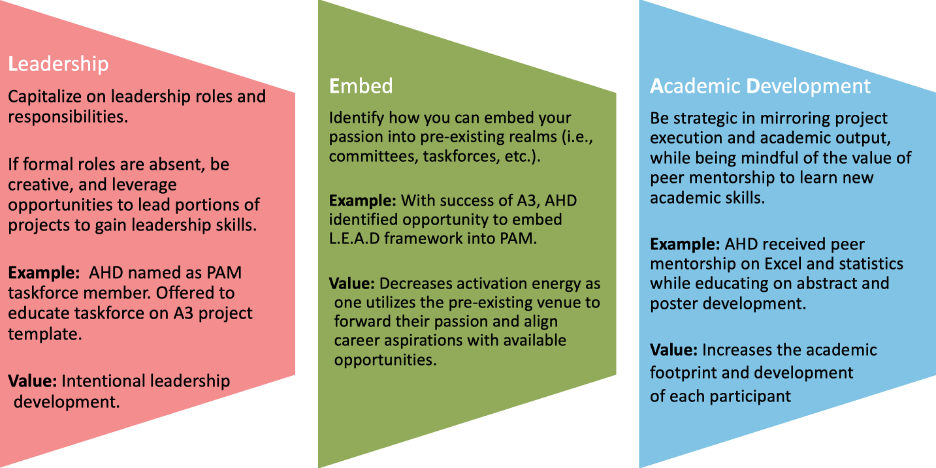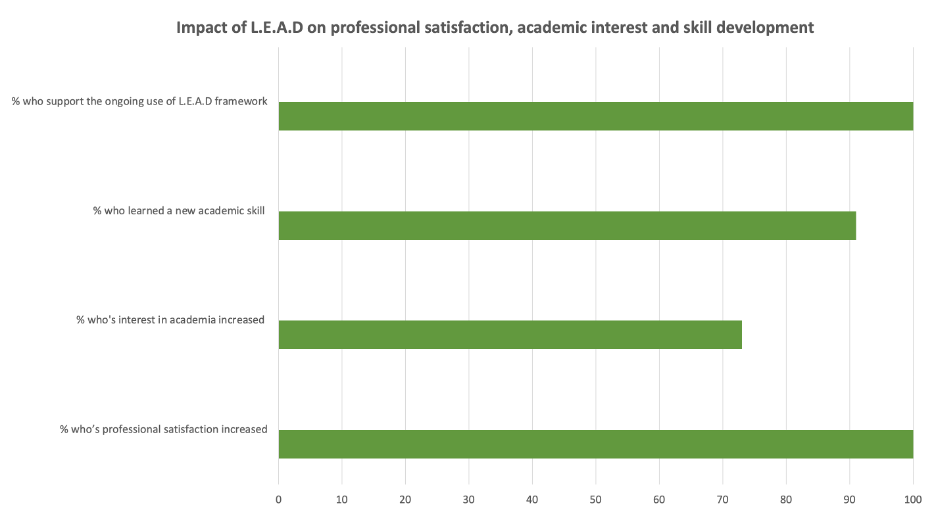Background: 83.3% of Hospital Medicine (HM) groups employ Advanced Practice Providers (APPs).1 However, per a study in Journal of Hospital Medicine APPs are less frequently involved (< 50%) in teaching, research, QI and leadership training suggesting underutilization of APPs in these realms.2 Furthermore, according to 2021 NCCPA data 40.2% of PAs identified professional burnout influenced their decision to leave their work setting.3 Since healthcare research suggests correlations with career engagement and lower levels of burnout, investment in professional development and diversification of APP careers can provide career satisfaction and retention.
Purpose: This abstract describes the implementation and evaluation of a novel framework, L.E.A.D. 1) Leadership (L) roles/opportunities; 2) Embedding (E) your idea/passion project within recognized avenues; 3) Academic Development (A.D), as an avenue to diversify APP careers and provide professional satisfaction.
Description: In 2019, HM developed a novel framework L.E.A.D within the context of medical education, resulting in a 10-fold increase in educator participation and academic output including an internal hospital level didactic presentation, 3 accepted national abstracts, and a published Academic Medicine innovation abstract. Due to section L.E.A.D success, the APP Hospitalist Director (AHD) advanced the framework to the hospital level. Figure 1Leadership (L)From 2021 – 2022, the AHD served on the hospital level Professional Advancement Model (PAM) taskforce with 13 institution APP leaders who had divergent and synergistic skills and career aspirations. Collectively, they committed to a culture of peer mentorship. Embed (E): Following leadership recognition, the AHD embedded the L.E.A.D framework in the taskforce by suggesting they approach the PAM development academically via 1) A3 template utilization; 2) creating a needs assessment 3) identifying academic opportunities to disseminate the product. This strategy helped diversify the project, mirror business drivers of hospital level stakeholders, and further the individual academic development of participants. Academic Development (A.D)Academic development mentorship was woven throughout PAM development. The AHD mentored taskforce participants new to each modality (A3, survey development, abstracts). In turn, the AHD received mentorship in advanced skills for statistics, REDcap™, Excel and PowerPoint from other taskforce participants. One major focus was the development and evaluation of a hospital level needs assessment of current state of APP professional development. Evaluation of results (43% survey response rate) led to poster acceptance for an internal symposium and submission to four national conferences.When surveyed, of the 11 respondents, 100% reported increased professional satisfaction after their initial year on PAM taskforce. 91% reported learning a new academic skill with 73% reporting increased interest in academia. Most impressively, 100% reported ongoing support of the L.E.A.D framework for PAM development. Figure 2.
Conclusions: By utilizing L.E.A.D, a 13-person hospital level taskforce increased their academic development and peer mentorship demonstrating academic hospitalists can leverage this framework to further the academic hospitalist footprint external to their individual sections. Furthermore, survey data supports incorporating academic development of APP providers to increase professional satisfaction of the workforce.


